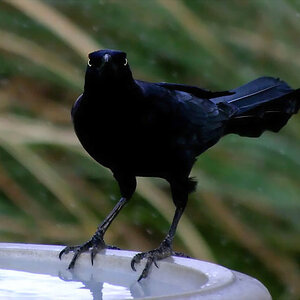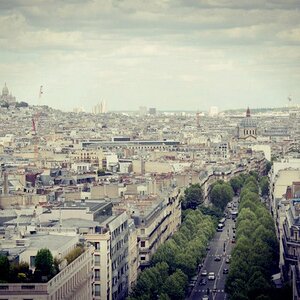Digital Matt
alter ego: Analog Matt
- Joined
- Jan 30, 2004
- Messages
- 5,358
- Reaction score
- 73
- Location
- Santa Barbara, CA
- Website
- www.mattperko.com
- Can others edit my Photos
- Photos NOT OK to edit
Well, what the heck. Here's my thoughts.
Since I'm a jazz musician, I'll give you another comparison. Jazz music, like photography, has a history, a tradition. It was born out of the combination of african rhythms, and early American blues music, and European Classical music. The music has evolved a lot over the last 100 years, as has photography. I see a lot of people today learning to play jazz, and ignoring the history of it, and it shows in their playing. It lacks depth. I can always hear it when a musican plays and he really knows how to play the blues. It gives a whole nother level of depth to the music. And if a person is well versed in classical music, it's another layer.
So, I think yes, traditional darkroom processes should be learned. All aspects of photography should be learned. You should have respect for the history of photograhpy and it's processes, because it shapes every inch of what is has become, and I think it would be ignorant to overlook that. There would be no digital photography without film photography. There would be no Adobe Photoshop without a darkroom.
Yes you should learn digital also, and in the end, probably spend more time on that than anything else, because that's where the technology is now, and yes, that is what people want to see, at least in commercial photography. And like has been said, it's a question of money for these schools, and also, who can they find to teach it? It's very cutting edge stuff, that a lot of photographers have been unwilling to learn. If you look on the internet, there's really only a handful of real digital "gurus", ie, experts in the tools of digital photography, from the cameras, to the software, and all the tips and tricks.
Until it becomes more established, you aren't going to find great digital programs at colleges I don't think. It's still in its infancy, in comparsion to photography as a whole. In the meantime, learn as much as you can about photography at school. It can only improve your digital photography, and when it comes to software, get a photoshop book, and take some graphic design courses. You'll want to know how to do that anyway. What a lethal combination. A graphic designer/photographer. Shoot all of your own stock, make all the money. Nothin wrong with that.
Since I'm a jazz musician, I'll give you another comparison. Jazz music, like photography, has a history, a tradition. It was born out of the combination of african rhythms, and early American blues music, and European Classical music. The music has evolved a lot over the last 100 years, as has photography. I see a lot of people today learning to play jazz, and ignoring the history of it, and it shows in their playing. It lacks depth. I can always hear it when a musican plays and he really knows how to play the blues. It gives a whole nother level of depth to the music. And if a person is well versed in classical music, it's another layer.
So, I think yes, traditional darkroom processes should be learned. All aspects of photography should be learned. You should have respect for the history of photograhpy and it's processes, because it shapes every inch of what is has become, and I think it would be ignorant to overlook that. There would be no digital photography without film photography. There would be no Adobe Photoshop without a darkroom.
Yes you should learn digital also, and in the end, probably spend more time on that than anything else, because that's where the technology is now, and yes, that is what people want to see, at least in commercial photography. And like has been said, it's a question of money for these schools, and also, who can they find to teach it? It's very cutting edge stuff, that a lot of photographers have been unwilling to learn. If you look on the internet, there's really only a handful of real digital "gurus", ie, experts in the tools of digital photography, from the cameras, to the software, and all the tips and tricks.
Until it becomes more established, you aren't going to find great digital programs at colleges I don't think. It's still in its infancy, in comparsion to photography as a whole. In the meantime, learn as much as you can about photography at school. It can only improve your digital photography, and when it comes to software, get a photoshop book, and take some graphic design courses. You'll want to know how to do that anyway. What a lethal combination. A graphic designer/photographer. Shoot all of your own stock, make all the money. Nothin wrong with that.



![[No title]](/data/xfmg/thumbnail/37/37097-8fae54adbc44059a8189fcf5e7bb8f76.jpg?1619737881)




![[No title]](/data/xfmg/thumbnail/41/41798-aacfc8368463d919cba743fe318706b6.jpg?1619739897)




![[No title]](/data/xfmg/thumbnail/42/42280-60cc6d4893a2f440eac7dd2248e733a9.jpg?1619740088)
